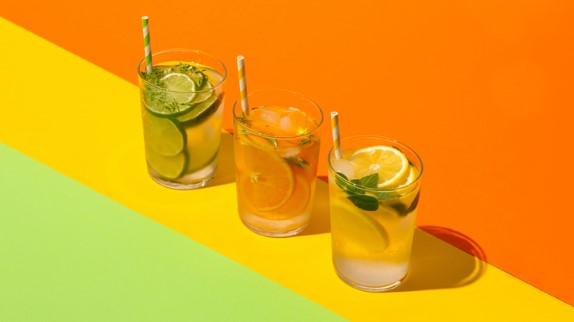Drinking enough fluids is always important — but never more so than when you’re expecting, since your water needs increase during pregnancy. Staying hydrated is crucial for your baby’s growth and development — and drinking up helps keep you feeling your best, too.
Both your body and your baby’s body are made up mostly of fluid. You need more liquids to support your expanding blood volume, as well as to produce enough amniotic fluid and support healthy fetal circulation.
What’s more, drinking enough can go a long way towards managing common pregnancy complaints like UTIs, constipation, hemorrhoids and fatigue. It’ll also help you replace lost fluids if you find yourself sweating like crazy these days.
How much should you strive to sip? Experts recommend getting 10 8-ounce glasses of water each day. But it doesn’t all have to take the form of plain old H2O. High water content fruits and vegetables (think watermelon, cucumbers, tomatoes, oranges) can also help you stay hydrated, as can other healthy beverages.
Still, you want to make sure the stuff that you’re sipping is good for both you and your growing bundle. So what are the best and worst drinks for pregnant women? Here’s a look at your options.
Best drinks for pregnant women
Water
Make H2O your default drink during pregnancy (and all the time, really!). Water helps your body absorb essential nutrients from food. It’s those nutrient-rich blood cells that reach the placenta — and ultimately, your baby.
Making water your go-to pregnancy drink is also an easy way to avoid drinking excess calories and sugar, so it can help you maintain a healthy pregnancy weight. It’s also a smart strategy for keeping your blood sugar levels in check if you have gestational diabetes.
More Healthy Eating Tips
If the thought of guzzling a big glass makes your stomach turn or leaves you uncomfortably full, don’t force it. Carry a water bottle with you, and take small sips throughout the day.
And if plain old water is getting boring? Give your glass a boost with mint sprigs, a squeeze of lemon or lime juice, sliced cucumber or even a few muddled berries.
Milk
You need 1,000 milligrams of calcium per day during pregnancy to support your baby’s growing bones and teeth, as well as keep your circulatory, muscular and nervous systems in working order.
And milk is one of the very best calcium sources, serving up around 300 milligrams in an 8-ounce glass. While you can get calcium from non-dairy foods like broccoli or kale, dairy foods like milk (as well as yogurt and cheese) are some of the easiest ways to get your fill.
The protein in milk also makes it a smart pick. Protein supports your baby’s overall growth, and it can also help you stay satisfied and full.
If you don’t do dairy, fortified soy milk is a good alternative. It has about the same amount of protein as cow's milk and is calcium-fortified, though the calcium isn’t absorbed quite as well. Just be sure to sip an unsweetened variety to avoid taking in added sugar.
Ginger tea
Hot or iced, ginger tea is a tasty option that’s safe to drink during pregnancy — and might even come with some added benefits. Studies show that ginger can help soothe an unsettled stomach and ease pregnancy-related nausea.
Can’t take your tea without a little sweetness? Adding a teaspoon or so of sugar is fine, as long as you factor it into your overall sugar and calorie intake for the day, especially if you’re drinking many cups of tea on the regular.
Since it’s hard to know for sure what's in boxed herbal teas (the Food and Drug Administration doesn't regulate herbs) your best bet is to brew your own ginger tea by steeping freshly sliced ginger root in boiling water.
Seltzer
If a glass of wine with dinner or a cocktail at a party are rituals you don’t want to completely give up, try a sparkling water spritzer as an alcohol-free alternative that’s hydrating and fun. (Especially when you pour it in a special glass.)
If you're craving something sweet, add a slice of fresh fruit or a splash of 100 percent fruit juice. Make sure it's pasteurized, though, since unpasteurized juices could harbor bacteria that make you sick.
Fruit and veggie smoothies
Sure, they might straddle the line between drink and food. But blended fruits and veggies are a delicious way to meet your daily produce needs and sneak in some extra hydration at the same time.
While the flavor combinations are practically endless, keep the added sugar in check by sticking with liquids like water, milk or plain yogurt instead of juice and limiting or skipping added sweeteners. Keep an eye out for added sodium in premixed veggie drinks, too. To make your smoothie more satisfying so you stay fuller longer, add a source of healthy fat like peanut or almond butter.
Drinks to avoid or limit during pregnancy
Now that you’re set on smart ways for how to hydrate during pregnancy, let's take a minute to recap what's off the menu.
- Alcohol. Steer clear of alcohol completely. There’s no level of alcohol that’s safe to consume when you’re pregnant.
- Unpasteurized juices and milk. They could harbor illness-causing bacteria.
You should also limit your intake of:
- Caffeinated drinks. Experts agree it’s okay to have up to 200 milligrams of caffeine daily during pregnancy. That’s roughly the amount in 12 ounces of brewed coffee.
- Soda. The sugar and empty calories won't fill you up, and a lot of sodas also contain caffeine.
- Juice. It’s fine to have a little 100 percent fruit juice, but juice doesn't contain as much fiber as whole fruit or smoothies (which can help with pregnancy constipation and bloating).





 Trending On What to Expect
Trending On What to Expect







